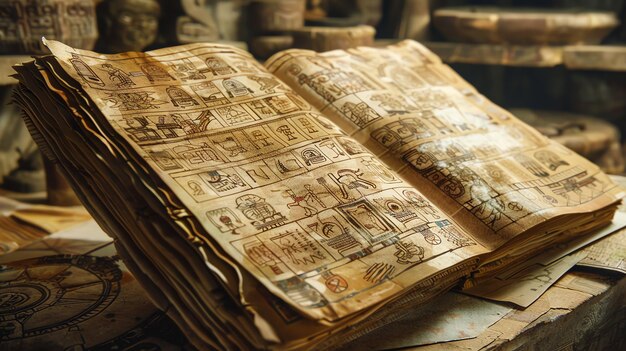
History has always played a pivotal role in shaping the present and guiding the future. The actions, decisions, and experiences of those who came before us offer invaluable lessons—both positive and negative—that can help us navigate the complexities of today’s world and prepare for what lies ahead. Whether in the realms of politics, science, social change, or technology, history is not just a collection of events; it is a compass that can direct our path forward. This article explores the ways in which history influences our future, providing lessons that can lead to progress, innovation, and a deeper understanding of ourselves.
Learning from Past Mistakes
One of the most significant ways in which history informs our future is by offering us valuable lessons from past mistakes. Humanity has experienced countless conflicts, economic crises, and social upheavals—many of which were preventable or avoidable if previous generations had made different choices. By studying history, we gain insight into the consequences of poor decisions, bad governance, and unchecked power.
For example, the devastation caused by World War I and World War II should serve as a constant reminder of the horrors of war, prompting ongoing efforts to maintain peace through diplomacy and international cooperation. The economic crashes of 1929 and 2008 teach us the dangers of unchecked speculation, inadequate regulation, and the fragility of global financial systems. By reflecting on these mistakes, societies can develop strategies to avoid repeating them, fostering a more stable and just world.
The Power of Innovation and Progress
While history certainly highlights mistakes, it also showcases the incredible progress humanity has made. From the Renaissance to the Industrial Revolution and the Information Age, history is a testament to human ingenuity and the power of innovation. Each period of history brings new ideas, inventions, and advancements that have fundamentally transformed society.
Take, for instance, the scientific revolution. The discoveries of Galileo, Newton, and others laid the foundation for modern science, influencing everything from medicine to space exploration. Similarly, the technological advances of the late 20th and early 21st centuries—such as the invention of the internet, the rise of artificial intelligence, and the exploration of renewable energy sources—are direct descendants of ideas and breakthroughs from history. By studying these past achievements, we are reminded of the potential of human creativity and are inspired to continue advancing toward new frontiers.
History also teaches us the importance of long-term thinking. For instance, the environmental movements of the 20th century, spurred by the realization of the impact of industrialization on the planet, have led to more sustainable approaches to energy, agriculture, and urban planning. The lessons of environmental degradation are prompting a global push for sustainability, renewable energy, and eco-friendly technologies—an essential focus for the future of our planet.
The Role of Social Movements in Shaping Society
History provides us with a record of social movements that have led to significant societal shifts, offering a blueprint for future generations seeking justice and equality. The civil rights movements of the 20th century, from the American civil rights movement to the anti-apartheid struggle in South Africa, provide powerful examples of how collective action, driven by the courage and persistence of individuals, can challenge deeply entrenched systems of oppression.
The feminist movement, LGBTQ+ rights movement, and labor rights movements are other examples where history has shaped future progress. Each of these movements has altered societal norms, influenced public policy, and promoted a more inclusive and equitable world. Today, these movements continue to inspire future generations to advocate for fairness and social justice, reminding us that the fight for equality and human rights is ongoing.
Politics, Diplomacy, and Global Relations
The lessons of history are especially vital in the realm of politics and diplomacy. Political leaders and governments can look to the past to understand how alliances, treaties, and conflicts have shaped the global order. For example, the formation of the United Nations after World War II was, in part, a response to the failures of the League of Nations and the catastrophic consequences of the two world wars. The idea was to create a platform for dialogue, dispute resolution, and cooperation to prevent future global conflicts.
Similarly, the Cold War taught us about the perils of ideological polarization, espionage, and the threat of nuclear warfare. Today, the global community must continue to balance competition and cooperation in the face of emerging challenges, such as climate change, pandemics, and geopolitical instability. The lessons of the past encourage nations to engage in diplomacy, foster multilateral cooperation, and strive for peaceful resolutions rather than escalation.
History as a Tool for Identity and Reflection
History also serves as a means of understanding who we are as individuals and as societies. Our collective history—whether it’s the story of a nation, a cultural group, or even a family—shapes our identity and provides context for our actions today. Understanding where we come from helps us appreciate our roots, enabling us to make informed decisions about where we are going.
For example, indigenous communities around the world continue to draw strength from their history, preserving traditions and stories passed down through generations. These histories are not only essential for cultural continuity but also for advocating for rights and recognition in the modern world. Similarly, national histories shape political narratives and inform how citizens view their role within a broader global context.
The Influence of History on Education and Critical Thinking
Education is one of the primary ways history impacts the future. By studying historical events, cultures, and ideas, students develop critical thinking skills that allow them to analyze current events and make informed decisions. History encourages people to think critically about the past, question assumptions, and explore different perspectives.
Educators often use historical examples to teach lessons about ethics, morality, and responsibility. For instance, discussions about past genocides, such as the Holocaust or the Rwandan Genocide, encourage reflection on the importance of human rights and the consequences of hatred and intolerance. History challenges us to learn from the past so that we can build a future that is more compassionate, just, and humane.
History in the Context of Technology and Innovation
As technology continues to advance at a rapid pace, understanding history can help us navigate the complexities of new innovations. The industrial revolutions, the rise of the internet, and the advent of artificial intelligence all serve as reminders that technological progress has wide-reaching social, economic, and political implications.
History offers us a perspective on the consequences of technological shifts—both the benefits and the challenges. The rise of mass production during the Industrial Revolution, for instance, led to economic growth but also contributed to the rise of labor movements and concerns about workers’ rights. Today, the digital age is giving rise to similar debates around data privacy, automation, and the future of work. By looking at how societies have historically adapted (or failed to adapt) to technological changes, we can better understand the challenges and opportunities posed by new technologies.
Conclusion
The past is not just a collection of dates and events; it is a guidebook for the future. History offers invaluable insights into human nature, society, and the world around us. By reflecting on the triumphs and failures of those who came before us, we can avoid repeating mistakes, build on past successes, and shape a future that is both innovative and informed by the lessons of history. Whether it’s learning from past conflicts, embracing progress, advocating for social change, or navigating the complexities of technology, history provides the tools we need to create a better tomorrow. In this way, the past is not just something to remember—it is something to guide us.



